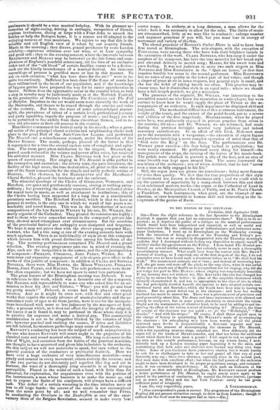TO THE EDITOR OF THE SPECTATOR.
Yorkshire, 26th September 1843. SIR—From the slight reference in the last Spectator to the Birmingham Festival, it appears that you had no representative there.* This is to be re- gretted; as it deprives the public of a critique on the musical performances which would have been independent and impartial, as well as useful and instructive—not like the ordinary run of indiscriminate and indiscreet news- paper laudations. I went up to Birmingham on the Wednesday evening, with the intention of being present at the Thursday and Friday's per- formances ; but was so completely disappointed with the Thursday morning's exploits, that I decamped without feeling any disposition to expose myself to another similar disappnintment on the Friday. I have heard The Messiah per- formed on several similar occasions, but certainly never in such a thoroughly unsatisfactory manner. What could have been the matter with Mrs. &Law? Instead of hearing, as I expected, one of the first singers of the day, I do not remember ever to have heard such a disastrous failure as in " He shall feed his flock." She commenced seriously out of Cone; and instead of recovering her- self, she got more and more off the pitch, to the very close, when it was awful. If she was so much out of health as to incapacitate her for singing, why did she not resign her part to Miss BAWLS ; whose singing was surpassingly beautiful. If my memory does not mislead me, Mrs. KNYVETT likewise has changed her style, by no means for the better : in place of the exquisite chasteness which formerly characterized it, and was so appropriate to the class of airs to which she has principally devoted herself, she appears to have adopted certain con- ventional turns and flouriahes, which she would have been wise in leaving to others. But the grand defect was in the choruses: and here her worthy husband has much to answer for. There was a grievous want of precision and good generalship about him. The drum and brass instruments were allowed not merely to overpower, but in some places absolutely to annihilate the voices. Ought not the instruments, of whatever kind, to be used for adding to and im- proving the effect of the voices, hasten(' of destroying it ? Moreover, the time of several of the choruses was too quick ; ex. gr. the "Hallelujah," "Bat thanks," "And with his stripes." Of course, I shall throw myself open to the charge of heresy in questioning Dr. WESLEY'S mode of accompanying the choruses : his solo-playing may have been worthy of all the praise bestowed upon it—he is unquestionably a first-rate organist and mu- sician—but his manner of accompanying the choruses in The Messiah, with a few squeaking mixture-stops, surprised me. How differently did the organ tell in the hands of MENDELssoun, and that too before the additions about which there has been such a parade! I felt urged to risk an opinion of my own on this notable performance, because, on my return home, I acci- dentally took up a London morning paper bepraising it to the skies, and maintaining that both solos and choruses were beyond any thing ever done before. Some of you Cocknies deem yourselves oracles, but it would hardly be safe for us clodhoppers to take as law and gospel all that any of your fraternity may say : there were choruses, especially some in the second part, that were done with excellent effect ; but when the full power of the orchestra ought to have been developed in its proper proportions, energy, and compact. ness, it was extremely unsatisfactory. if, with such an orchestra at hie command as that assembled at Birmingham, Mr. KNYVETT cannot produce a better performance of 77te Messiah, he ought surely never again to be placed in the position of conductor. lie marred the former festival, (perhaps not so much as this,) and the last York Festival: surely he has given sufficient proof of incapacity. I am, Sir, very respectfully yours, A YORKSHIREMAN. * Our correspondent's guess is correct. The programme of the Birmingham Festival did not possess attraction enough to draw us from London; though it sufficed for the local uses its managers had in view.—ED.]


























 Previous page
Previous page